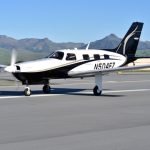

Hydrogen plane tests set for Orkney

A project which could see the entire aviation industry in Orkney decarbonised has been given huge financial backing.
The HyFlyer project aims to decarbonise medium range small passenger aircraft by demonstrating hydrogen fuel cell powertrain technology.
It is a project which presents significant opportunities in Orkney since all flights from Kirkwall could potentially be serviced by this new technology.
The project has been awarded £5.3 million of UK Government funding and will culminate in a 300 nautical mile demonstration flight out of Orkney by 2022.
Orkney Islands Council leader James Stockan said: “In Orkney we are seeking to be clean, green islands.
“Transport is our biggest decarbonisation challenge, with our remote and rural setting placing our islanders in the position of producing a significant carbon footprint.
“Initiatives like this are presenting us with opportunities to reduce this carbon footprint and support Orkney Islands Council’s climate emergency declaration. I look forward to the project progressing.”
Led by ZeroAvia, developers of hydrogen fuel cell powertrain solutions, HyFlyer will demonstrate a phased approach from battery power to hydrogen power, integrating the new technology aboard a Piper M-class six-seater aircraft which will perform test flights out of Cranfield and Orkney.
Project partners Intelligent Energy will optimise its high power fuel cell technology for application in aviation while EMEC Hydrogen, producers of green hydrogen from renewable energy, will supply the hydrogen required for flight tests and develop a mobile refuelling platform compatible with the plane.
The HyFlyer project will see conventional piston engines in propeller aircraft replaced by electric motors, hydrogen fuel cells and gas storage.
If all goes well, ZeroAvia, based in California, are aiming to supply the technology to commercial manufacturers by 2022.
Following this demonstration, the next goal then is to power an aircraft, carrying up to 20 passengers, to travel 500 miles.
According to the Air Transport Action Group, aviation is responsible for 12 per cent of CO2 emissions from all transport sources and is one of the fastest growing sources of global emissions.
Val Miftakhov, founder and CEO of ZeroAvia, said: “The substantial backing provided by the UK Government underlines the potential that hydrogen holds as a fuel source for commercial aviation and provides significant validation of ZeroAvia’s approach to zero emission flight.
“Our project goal of 300 NM is equivalent to the distance from London to Edinburgh and will prove that zero emission aviation, powered by hydrogen, can play a key role within the UK and other countries’ transport strategies — enabling net zero targets to be met and improving productivity and regional prosperity.”
Richard Ainsworth, Hydrogen Project Specialist at EMEC Hydrogen, said: “HyFlyer is another key step in Orkney’s aim to decarbonise lifeline transport services for islanded communities.
“Hydrogen has the potential to help meet our emission commitments where electrons and batteries can’t.
“This project sees us one step closer to meeting our fuel and energy needs from abundant local renewable energy resources using green hydrogen.”